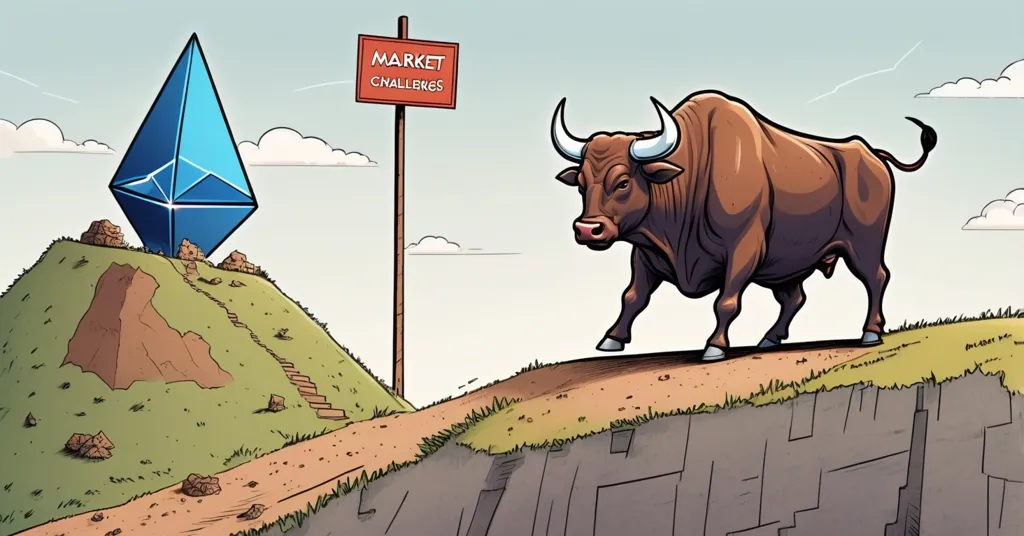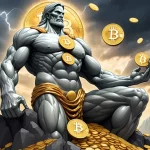BlackRock Pushes for Staking in Ethereum ETFs Amid Market Challenges

BlackRock’s Bold Move: Pushing for Staking in Ethereum ETFs Amid Market Turbulence
BlackRock’s push to include staking in Ethereum ETFs could be a game-changer for the crypto market. The firm believes that this feature, absent from current ETFs, is crucial for attracting investors and revitalizing interest in Ethereum.
- BlackRock advocates for staking in Ethereum ETFs
- Ethereum faces market challenges, regulatory hurdles
- Staking could redefine crypto investing landscape
BlackRock’s Staking Strategy
BlackRock, a financial titan known for its market-moving decisions, is now setting its sights on revolutionizing Ethereum Exchange Traded Funds (ETFs) by advocating for the inclusion of staking. Staking, introduced with Ethereum’s transition to proof-of-stake (a method where users earn rewards for holding and ‘staking’ their ETH) with Ethereum 2.0, allows ETH holders to earn yields by locking their tokens on the network. This feature, however, has been conspicuously absent from Ethereum ETFs launched in July, leading to underwhelming demand compared to their Bitcoin counterparts.
Robert Mitchnick, BlackRock’s head of crypto, recently spotlighted this initiative at the Digital Asset Summit, arguing that staking could be the key to unlocking greater investor interest in Ethereum ETFs. “There’s no question it’s less perfect for ETH today without staking,” Mitchnick stated, emphasizing the importance of this feature for potential investors.
While BlackRock’s move towards staking in ETFs sounds promising, it’s crucial to recognize the fine print. Staking turns crypto into something akin to a savings account, which is appealing but comes with its own set of regulatory headaches that could dampen the party.
Ethereum’s Market Challenges
Despite the clear benefits, Ethereum faces its own set of market woes. The cryptocurrency has seen its price plummet by over 40% this year, influenced by unclear narratives, declining revenue, and stiff competition from platforms like Solana. According to recent reports, Ethereum’s revenue has declined significantly over the past year, reflecting the market’s challenges. Standard Chartered, reflecting this bearish sentiment, slashed its ETH price target by more than half.
Meanwhile, Solana’s upcoming Firedancer upgrade promises to increase its transaction speed, potentially attracting more developers and users away from Ethereum. This competition adds another layer of complexity to Ethereum’s market struggles. Yet, it’s not all doom and gloom; Ethereum’s complexity and its pivotal role in blockchain innovation remain compelling elements for long-term investors.
Regulatory Hurdles
Integrating staking into ETFs is fraught with regulatory hurdles, primarily from the Securities and Exchange Commission (SEC). The SEC’s classification of some staking services as unregistered securities under the Howey Test poses a significant challenge. Yet, Mitchnick remains optimistic, suggesting that resolving these issues could lead to a significant increase in activity around these products.
The SEC’s formation of a crypto task force to clarify the security status of digital assets, with a roundtable discussion on the horizon, could be a game-changer in the regulatory landscape. As BlackRock navigates these choppy waters, the crypto community watches closely. But let’s not forget, the devil is in the details, and regulatory battles could be a marathon, not a sprint.
Broader Implications and Future Outlook
While Ethereum struggles, BlackRock is not putting all its eggs in one basket. The firm’s launch of BUIDL, a tokenized money market fund on Ethereum, and its subsequent expansion to Aptos and Polygon, showcases a broader strategy in the crypto space. This diversification indicates BlackRock’s commitment to digital assets beyond just advocating for staking in ETFs.
Amidst this evolving narrative, it’s worth considering the broader implications of staking and its potential to shift the dynamics of the crypto market. Ethereum’s upcoming Dencun upgrade, promising lower gas fees and increased efficiency through danksharding, might offer a glimmer of hope. Yet, the competition with Solana, buoyed by its own technological advancements like the upcoming Firedancer upgrade, adds another layer of complexity to this already intricate puzzle.
As BlackRock pushes for staking in Ethereum ETFs, one thing is clear: the future of crypto investing hangs in the balance. Will this be the catalyst Ethereum needs, or another regulatory battle? Only time will tell.
Key Questions and Takeaways
What is BlackRock’s stance on staking in Ethereum ETFs?
BlackRock believes that incorporating staking into Ethereum ETFs is essential to make them more attractive to investors, as the lack of staking has been a significant reason for the weak demand.
Why have Ethereum ETFs not performed well since their launch?
Ethereum ETFs have not performed as expected due to the absence of staking, which is a key feature for generating returns in the Ethereum ecosystem.
What challenges does BlackRock face in integrating staking into ETFs?
The main challenge is regulatory, with the SEC’s classification of some staking services as unregistered securities under the Howey Test. The complexity of implementing staking within the ETF structure also presents technical difficulties.
What is the current state of Ethereum’s market performance?
Ethereum has experienced a significant price drop of over 40% this year, influenced by unclear narratives, declining revenue, and competition from platforms like Solana.
How does BlackRock view the long-term potential of Ethereum?
BlackRock views Ethereum as a complex but promising investment due to its role in blockchain innovation and adoption, despite short-term market challenges.
What are the potential impacts of staking on the crypto market?
Staking could increase investor interest in Ethereum ETFs, potentially leading to greater mainstream adoption of cryptocurrencies. However, it also raises concerns about increased regulatory scrutiny and the risk of centralization.
What upcoming upgrades could affect Ethereum’s market position?
Ethereum’s Dencun upgrade aims to lower gas fees and increase efficiency through danksharding, which could improve its competitiveness. However, Solana’s Firedancer upgrade poses a significant challenge to Ethereum’s market position.



